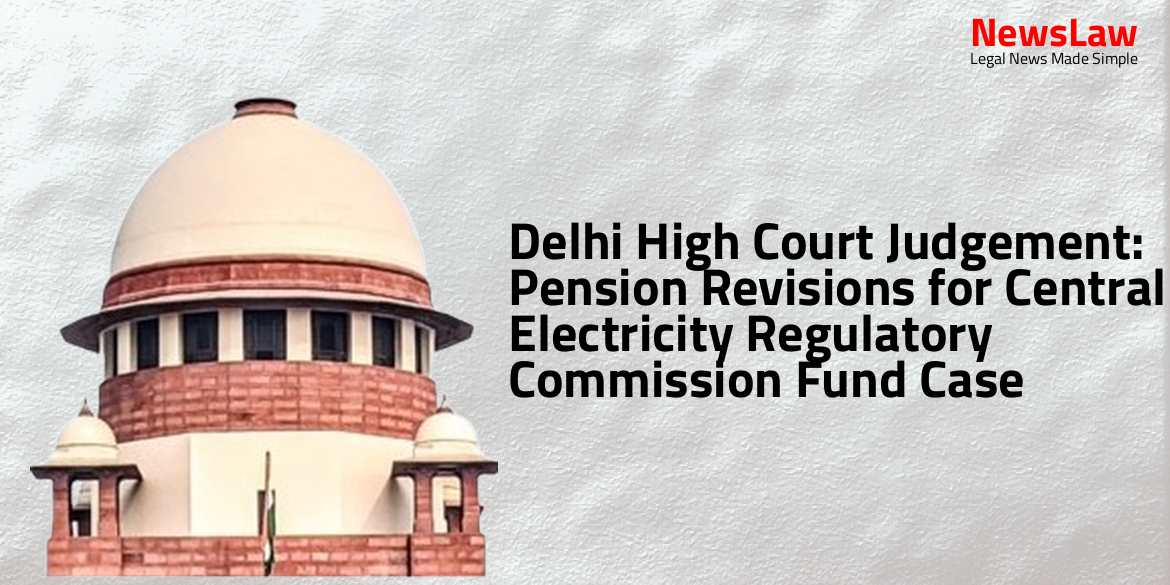The Delhi High Court recently issued a significant judgement regarding pension revisions in the case related to the Central Electricity Regulatory Commission Fund. This ruling has implications for the manner in which pensions are calculated and adjusted. Stay informed about the details of this case involving the Central Electricity Regulatory Commission Fund.
Facts
- The Petitioner filed a Reply Affidavit stating that grants made to CERC were from the Consolidated Fund of India.
- The expenses of CERC, including salaries and allowances, were initially charged to the Consolidated Fund of India up to 31 March, 2004.
- From 1 April, 2004 onwards, the expenses were charged to ‘Grants-in-aid’ received through budgetary support.
- The CERC Fund Account became operational on 1 October, 2004. However, expenditures for the period 1 April, 2004 to 30 September, 2004 were adjusted against ‘Grants-in-aid’.
- The CERC Fund did not exist from 1 April, 2004 to 6 June, 2004, as the Fund Rules were notified only on 22 October, 2007.
- Pension is a recurring cause of action that can be revised upon discovering errors in the granted amount.
- The earlier Division Bench framed two issues regarding the fixed pension for the Petitioner and the possibility of recovery by the Respondents for past periods.
- Notice was issued to Respondents to file a counter affidavit.
- Rule 33 and Note-7 define ’emoluments’ and ‘foreign service’ respectively.
- In 2018, it was discovered that pension and benefits were wrongly fixed on Rs.19,900 and were revised downwards to Rs.14,875.
- Counsel for the Petitioner argued that the earlier Division Bench’s findings are final.
- The CERC explained that after 1 April, 2004, the Ministry of Power handled payment functions on an interim basis.
- The CAT dismissed the Petitioner’s Original Application without issuing a show cause notice.
- The CERC received budgetary support as Grants-in-aid from 2004-05 onwards.
- Salaries paid from 1 April, 2004 were from the CERC Fund, funded by Grants-in-aid from the Central Government.
Arguments
- Counsel for Respondent emphasized the applicability of Note 7 to Rule 33 of the CCS Pension Rules due to budgetary support provided to CERC in the form of ‘grants-in-aid’.
- It was argued that the petitioner was on ‘foreign service’ as his salary was not sourced from the Consolidated Fund of India.
- Referring to Rule 70(2) and (3) of the CCS Pension Rules, it was highlighted that retired government servants must refund excess pension within two months of notice.
- Failure to refund would result in adjustments in pension payments.
Analysis
- Grants-in-aid of Rs.9.55 crores approved by Parliament in the Annual Budget for Ministry of Power in 2004-05 provided to CERC.
- Expenses of the CERC, including salaries and allowances, were charged to the Consolidated Fund of India until 31-03-04.
- From 1 April, 2004, CERC received budgetary support as Grants-in-aid and was governed by existing rules.
- Interim arrangement with Ministry of Power administering CERC Fund until 30 September, 2004.
- Salary of petitioner debited to CERC Fund from 1 April, 2004 till the petitioner’s final absorption in CERC on 6 June, 2004.
- Recovery of excess pension disbursed to the petitioner by the CERC directed in March 2020.
- CERC funds and accounts operationalized from 1 October, 2004, with expenditure adjusted against Grants-in-aid for 2004-05.
- CERC extended budgetary support by Central Government in form of Grants-in-aid from 2004-05 onwards.
- CERC Fund governed by Section 99(2) of Electricity Act, 2003, with salaries and remuneration met from CERC Fund.
- Audit report confirms CERC fully funded by Government of India, Ministry of Power.
- Section 98 of the Act allows the Central Government to provide grants and loans to the Central Commission.
- The Central Electricity Regulatory Commission Fund is established under Section 99, which includes grants, loans, fees, and other sources of income.
- The Fund is utilized for salaries, expenses, and functions of the Central Commission as defined in the Act.
- The Central Government, in consultation with the Comptroller and Auditor-General of India, prescribes the manner of applying the Fund for specified expenses.
- Excess payments made on account of a mistake by the employer without fault of the employee
- Cannot be subsequently recovered from the employee
- Respondents cannot recover the excess amount paid to the petitioner at this stage.
- The case of the petitioner falls under scenarios (ii) and (iii) as per Rafiq Masih principles.
- There is no allegation of misrepresentation or fraud by the petitioner in receiving excess pension.
- The higher fixation of pension was a result of a mistake in interpreting the CCS Pension Rules by the respondents.
Decision
- Partial allowance of the writ petition
- No infirmity in the refixation of pension
- Revised pension to be disbursed from 5 March, 2020
- Communication dated 21 May, 2020 to be refunded to the petitioner
- Disposal of the pending application
Case Title: K S DHINGRA Vs. UNION OF INDIA AND ORS. (2024:DHC:4562-DB)
Case Number: W.P.(C)-4473/2021



